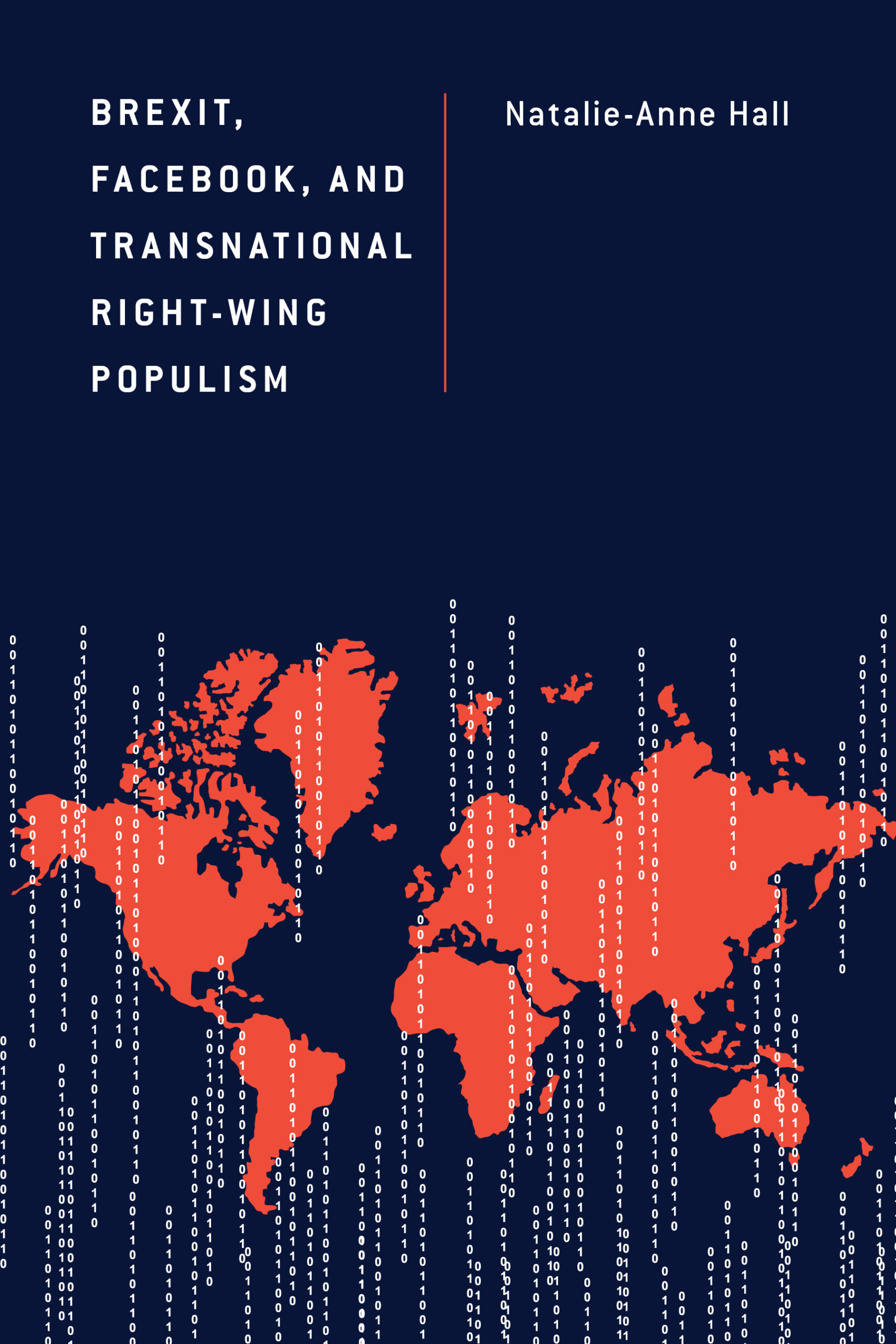
CRCC Member Natalie-Anne Hall publishes book on Brexit, Facebook, and Transnational Right-Wing Populism
The 2016 “Brexit” referendum heralded an age in which disinformation and divisive messaging spread on social media play a significant role in politics. The world is still grappling with how to deal with the impact of this on the health of democracy and society.
While the majority of research in this area has focused on observing or monitoring online content, this approach leaves something out. It separates that content from the people who post, see and interact with it, and the contexts in which they do so. This means we still know relatively little about people’s experiences of engaging with misleading, hateful, discriminatory, or extreme content. To understand why such messaging appeals (or does not appeal) to people, and the impact that it has on them, we need to seek experiences and interpretations from users themselves.
In her recently published book Brexit, Facebook, and Transnational Right-Wing Populism published by Lexington Books, CRCC member Dr Natalie-Anne Hall documents the first study to connect right-wing populist online content with offline lives. The book draws on an innovative, multi-method study with “pro-Brexit Facebook users” after the referendum. Hall recruited 15 Facebook users who had publicly shared at least one pro-Brexit post within the past month, conducted two in-depth interviews with each, and observed what they posted to Facebook over a one-month period. The aim was to understand why people engaged in pro-Brexit Facebook use and what it meant to them.
The study was set within the divisive context of post-2016 Britain. At that time, Brexit was a prominent, daily topic in the news. Theresa May was struggling to negotiate an exit deal in the face of parliamentary, EU, and public opposition. Meanwhile, Remain supporters decried the result of the referendum as invalid, as a potential economic and diplomatic disaster, and a social disaster in the form of a triumph of racist attitudes.
Although the post-referendum period has seldom been the focus of populism research, these conditions were ripe for exploitation by right-wing actors using the typical populist devices of people-centrism and anti-elitism. By claiming that the democratic mandate or “will of the people” was under threat and that metropolitan elites and those with political power did not have the interests of “the people” at heart, politicians, media, and other nefarious actors were able to fan the flames of discontent among the Brexit supporting public. On Facebook, dozens of pages and groups emerged around support for Leave, some with hundreds of thousands of followers, calling for something to be done about the “traitors” allegedly derailing Brexit.
As Brexit, Facebook, and Transnational Right-Wing Populism demonstrates, this provided the opportunity for the racist and illiberal attitudes that were crystallised by Brexit to continue to be salient online in the aftermath of the referendum. The connected affordances of social media allowed the pro-Brexit “milieu” on Facebook to become integrated with a vast array of right-wing causes, populist and far-right voices and ideologies, from around the world. This enabled online support for Brexit to be about more than Euroscepticism or even Britain.
In this milieu, insidious links were constantly being drawn between things like gender rights and multiculturalism; political correctness and “open borders”; or European integration and media bias. For the users who were participating in this milieu, an interest in Brexit became merely a starting point for the development and articulation of an array of concerns that bore no obvious relation to the issue of Britain’s membership in the EU.
The analysis in the book reveals that these interconnections were facilitated by the discursive devices of White victimhood and what Hall calls ‘Right victimhood’. While White victimhood is well-documented in the study of online racist movements, Right victimhood is a newly significant and overlooked discourse. It claims that progressive cultural and minority rights agendas are malevolent oppression of those with conservative views. Right victimhood legitimises hostile attitudes towards minoritised members of society by demonising the movements that advocate their protection. Right victimhood is seen in rhetoric about “cancel culture” and the “wokerati” that has entered the vernacular of mainstream politicians.
On Facebook, these transnationally-shared victimhood sensibilities connected the pro-Brexit Facebook milieu to the conspiracy theories of the Great Replacement and Cultural Marxism popular with the transnational far-right today. In this way, the “mainstream” political issue of Brexit acted as a catalyst for engagement with more extreme and international forms of right-wing politics.
Hall’s findings have important implications for how we understand the role of social media platforms in engagement with right-wing populist politics globally, and in the propagation of the exclusionary, illiberal, and racist ideas that are inseparable from right-wing populism. They are evidence of the strength of the transnational far and populist right’s reach, enabled by the algorithmic affordances of social media. The book should serve as a warning to policymakers and civil society. In 2024, this will be ever more important, as the world goes to the ballot box amidst increasingly sophisticated online manipulation tactics and dog-whistle “culture war” political rhetoric.
Bio:
Natalie-Anne Hall is a Lecturer in Social Sciences at Cardiff University. She was a postdoctoral research associate on the Everyday Misinformation Project at Loughborough University and holds a PhD in Sociology from the University of Manchester.